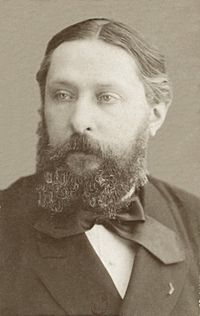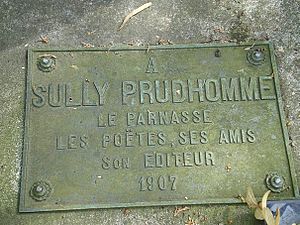Sully Prudhomme facts for kids
Quick facts for kids
Sully Prudhomme
|
|
|---|---|

Prudhomme in the 1880s
|
|
| Born | René François Armand Prudhomme 16 March 1839 Paris, France |
| Died | 6 September 1907 (aged 68) Châtenay-Malabry, France |
| Occupation | Poet and essayist |
| Nationality | French |
| Notable awards | Nobel Prize in Literature 1901 |
René François Armand Prudhomme (who went by "Sully" Prudhomme) was a French poet and writer. He was born on March 16, 1839, and passed away on September 6, 1907. He made history as the very first person to win the Nobel Prize in Literature in 1901.
Sully Prudhomme was born in Paris, France. He first planned to become an engineer. However, he later became very interested in philosophy and then in poetry. He wanted to write poems that combined art with scientific ideas. He was known for being honest and a bit thoughtful. His work was connected to a group of poets called the Parnassians, but he also had his own unique style.
Contents
Early Life and Studies
Sully Prudhomme's father was a shopkeeper in France.
Sully Prudhomme went to a school called the Lycée Bonaparte. But he had problems with his eyes, which stopped him from finishing his studies there. For a while, he worked at a steel factory in the Creusot region. After that, he started studying law in an office where legal documents are prepared. Some of his first poems were well-received by a student group called the Conférence La Bruyère. This positive feedback encouraged him to become a writer.
His Writing Journey
Sully Prudhomme's first collection of poems was called Stances et Poèmes (which means "Stanzas and Poems"). It came out in 1865 and was praised by a famous critic named Sainte-Beuve. This collection included his most well-known poem, Le vase brisé (meaning "The Broken Vase"). He published more poetry before the Franco-Prussian War began. This war, which he wrote about in Impressions de la guerre (1872) and La France (1874), affected his health for the rest of his life.
Over time, Prudhomme's writing changed. He started with a more emotional style in his early books. Later, his poems became more personal. He combined the formal style of the Parnassian poets with his interest in deep philosophical and scientific topics. One of his inspirations was the ancient Roman poet Lucretius, especially his work De rerum natura (meaning "On the Nature of Things"). Prudhomme even translated the first part of this work into French poetry.
He shared his philosophical ideas in his poems La Justice (1878) and Le Bonheur (1888). These poems used very simple language, which some people felt made them less poetic. In 1881, he was chosen to be a member of the Académie française, a very important French institution that protects the French language. He also received another honor, becoming a Chevalier de la Légion d’honneur in 1895.
After Le Bonheur, Prudhomme stopped writing poetry. Instead, he focused on writing essays about art and philosophy. He published two important essays: L'Expression dans les beaux-arts (1884) and Réflexions sur l'art des vers (1892). He also wrote a series of articles about the famous philosopher Blaise Pascal in a magazine called La Revue des Deux Mondes (1890). In 1906, he wrote an article about free will called La Psychologie du Libre-Arbitre.
Winning the Nobel Prize
Sully Prudhomme was the very first writer to receive the Nobel Prize in Literature. He was given the award "in special recognition of his poetic composition, which gives evidence of lofty idealism, artistic perfection and a rare combination of the qualities of both heart and intellect." This means his poems showed high ideals, were beautifully made, and combined emotion with intelligence.
He used most of the prize money to create a special poetry award. This award is given by a group called the Société des gens de lettres. In 1902, he also helped start another group called the Société des poètes français with other poets like Jose-Maria de Heredia and Leon Dierx.
Later Years and Passing
Towards the end of his life, Sully Prudhomme's health was very poor. He had been ill since 1870. Because of his health, he lived almost like a recluse (someone who stays away from others) in Châtenay-Malabry. He suffered from attacks of paralysis but continued to work on his essays. He passed away suddenly on September 6, 1907. He was buried at the Père-Lachaise Cemetery in Paris.
See also
 In Spanish: Sully Prudhomme para niños
In Spanish: Sully Prudhomme para niños
 | Isaac Myers |
 | D. Hamilton Jackson |
 | A. Philip Randolph |


